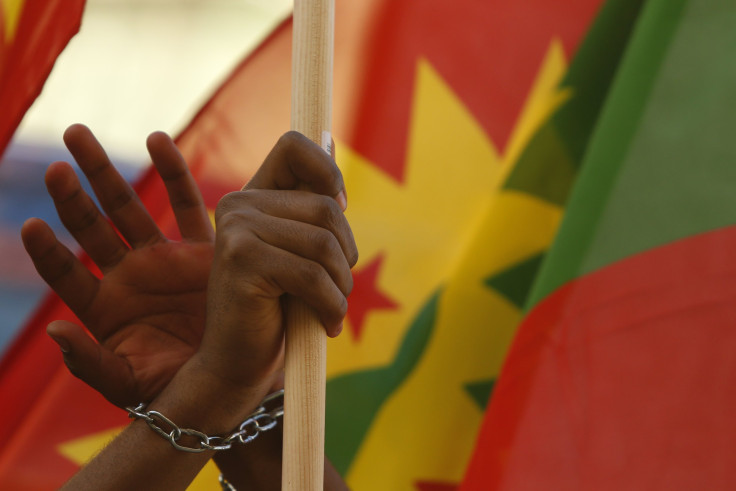Ethiopia Oromia Protests: Hundreds Killed, Thousands Arrested In 'Brutal Crackdown,' Human Rights Watch Says

Ethiopian authorities are allegedly violently quashing protests in its restive Oromia region, with near-daily accounts of killings and arbitrary arrests, researchers at Human Rights Watch said Monday in a damning report. Activists claim more than 200 people have been killed, while thousands remain in detention without charges since November. Security forces have shown no sign of letting up.
“Things have become considerably more violent in the last few days,” Felix Horne, Horn of Africa researcher at Human Rights Watch, said in an interview Monday. “The government needs to back down and stop the brutal crackdown.”
Since late November, massive anti-government demonstrations have erupted in towns across Oromia, home to Ethiopia’s largest ethnic group, the Oromo. The protesters and opposition members were initially fighting against an urban plan that would integrate infrastructure development and expand the municipal boundaries of the capital of Addis Ababa into surrounding towns in Oromia. There were fears the expansion would displace ethnic Oromo farmers from their land.
Oromia is the most populous of Ethiopia’s nine ethnically based federal states, with a population of at least 27 million people. The region has its own language, Oromo, which is distinct from Ethiopia’s official Amharic language, according to Agence France-Presse.
#Ethiopia: Stop firing on peaceful demonstrators and listen to their concerns #Oromoprotests https://t.co/ukOLCQTwbs pic.twitter.com/r1N43BOjEq
— Felix Horne (@FelixHorne1) December 19, 2015
The Ethiopian government responded to the largely peaceful protests by flooding Oromia with federal security forces. The proposed Addis Ababa Integrated Development Master Plan was retracted Jan. 12, but activists and researchers said that has not halted protests or the alleged crackdown in Oromia.
Human Rights Watch, a New York-based rights group, has been unable to verify the total number of people reportedly detained and killed due to the government’s restrictions on access and independent reporting in Ethiopia. But researchers have interviewed a number of witnesses and 20 people who have been arrested since the demonstrations began, and social media has helped disseminate photos and videos from scenes of the protests.
“Given the limitations on independent reporting on the ground, it’s hard to know precisely what has been happening, but there definitely appears to be an escalation in the intensity of the protests in some locations and also of the government’s response,” Horne said Monday. “There have been many reports of killings in the last several days.”
Many of those arrested have been children under 18 because primary and secondary school students in Oromia were among the first to protest. Some schools and universities have remained shuttered throughout Oromia because authorities have also arrested teachers and closed the facilities to curb demonstrations, according to the report.
One 17-year-old student described to Human Rights Watch researchers how Ethiopian security forces shot dead three classmates who were chanting against the expansion plan. “They walked into the compound and shot three students at point blank range,” the student said in the report. “They were hit in the face and were dead.”
Multiple eyewitnesses told Human Rights Watch that security forces hurled a grenade at students at Jimma University in western Oromia and wounded dozens Jan. 10. Security forces also allegedly stormed the school's dormitories and beat ethnic Oromo students, the report said.
#OromoProtests TPLF soldiers invade Darimu town Elu ababo in anticipation of protest there #Ethiopia #Oromia pic.twitter.com/Y2fIXfUcwE
— Azhar Beyan (@AzharBeyan) January 5, 2016
Getachew Reda, Ethiopia’s communications minister, dismissed the report’s allegations against security forces as an “absolute lie,” telling BBC News Monday that Human Rights Watch has been “churning out report after report” on Ethiopia without a presence in the landlocked East African nation. He said it was a “stroke of magic” for the group to release a report “from halfway across the world.”
In January, the European Parliament passed a motion for resolution condemning the reported crackdown, saying the Ethiopian government has “labeled largely peaceful protesters as ‘terrorists'” and are “deploying military forces against them.” The United States, however, has not outright condemned the violence but rather expressed deep concern and called for dialogue.
For years, the U.S. has enjoyed cozy relations with Ethiopia, which is strategically located in the Horn of Africa region. In 2012, Ethiopia received $580 million in American foreign aid. The Ethiopian government has allowed the United States to deploy drones into Somalia from southern Ethiopia to target al-Shabab militants, according to the Washington Post.
“Ethiopia’s donor countries have responded tepidly, if at all, to the killing of scores of protesters in Oromia,” Leslie Lefkow, deputy Africa director at Human Rights Watch, said in a statement Monday. “They should stop ignoring or downplaying this shocking brutality and call on the government to support an independent investigation into the killings and other abuses.”
© Copyright IBTimes 2025. All rights reserved.





















